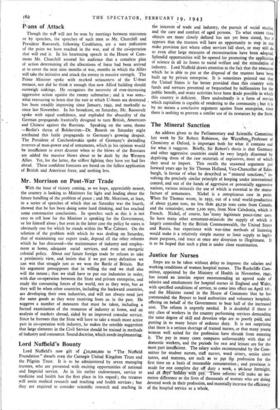The Mineral Sanction
An address given to the Parliamentary and Scientific Committee last week by Sir Robert Robinson, the WaynfleteeProfessor of Chemistry at Oxford, is important both for what it contains and for what it suggests. Briefly, Sir Robert's thesis is that Germany and other aggressive countries could be very largely disarmed by depriving them of the raw materials of explosives, most of which they need to import. This recalls the reasoned argument put forward years ago by Sir Thomas Holland, Vice-Chancellor of Edin- burgh, in favour of what he described as " mineral sanctions," in- volving the precisely similar principle of keeping under international control, and out of the hands of aggressive or potentially aggressive nations, various minerals the use of which is essential to the manu- facture of armaments. Nickel is a conspicuous case its point. When Sir Thomas wrote, in 1935, out of a total world-production of about 55,000 tons, no less that 49,230 tons came from Canada, and the remainder, some 5,100 tons, from New Caledonia, which is French. Nickel, of course, has 'many legitimate peace-time uses. So have many other armament-minerals the supply of which is largely controlled by the British Commonwealth, the United States and Russia, but experience with war-time methods of licensing would make it a relatively simple matter to limit supply to legiti- mate purposes, rind trace at once any diversion to illegitimate. It is to be hoped that such a plan is under close examination.


























 Previous page
Previous page